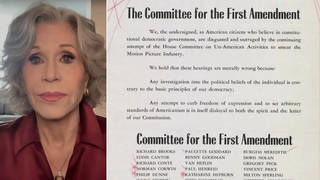
Guests
- James Branumlawyer who specializes in representing military deserters and conscientious objectors. He is also legal director for the Oklahoma Center for Conscience and Action and author of US Army AWOL Defense: A Practical Guide.
The Taliban has released a video showing the handover of Army Sergeant Bowe Bergdahl to U.S. Special Operations Forces in the deal that saw the U.S. exchange five high-ranking Taliban militants held at Guantánamo Bay. Despite winning the freedom of the only known U.S. prisoner of war, the deal has come under Republican attack amidst reports Bergdahl voluntarily left his base after growing opposed to the war in Afghanistan. Army officials say they will investigate whether Bergdahl engaged in misconduct, and several of the soldiers who served with him have taken to the media to call him a deserter. “[Bergdahl] is speaking as someone who has seen firsthand what the American imperial machine is all about … and is responding from a very core, visceral place,” says James Branum, a lawyer who specializes in representing U.S. military deserters and conscientious objectors. “One can’t help be moved by that.” Branum adds that most other soldiers convicted of desertion, including many of his clients, have received six- to 24-month sentences. “[Bergdahl] has already effectively served more jail time than anyone ever has in the modern era for desertion, in his time as a POW. Given that, there is no reason to punish him.”
Transcript
NERMEEN SHAIKH: The Taliban has released a video reportedly showing the handover of Army Sergeant Bowe Bergdahl to U.S. Special Operations Forces five years after he was taken captive. In the video, a clean-shaven Bergdahl is shown sitting in a pickup truck prior to his release. One of the men tells him, quote, “Don’t come back to Afghanistan. Next time we catch you, you won’t leave here alive.” He’s then brought out of the truck as a Black Hawk helicopter lands in a nearby open field. Two of the men, one waving a white flag, lead Bergdahl to meet three men in what appear to be civilian clothes. The men pat him down and flash a thumbs-up, then lead him into the helicopter, where U.S. soldiers appear to be waiting. Seconds later, the copter lifts off.
Bergdahl was released over the weekend in exchange for five high-ranking Taliban militants who had been held at Guantánamo Bay. The White House has apologized to key lawmakers for not notifying them of the prisoner swap in advance. Speaking with reporters on Tuesday, Senator Dianne Feinstein said she received a call Monday night.
SEN. DIANNE FEINSTEIN: Unless something catastrophic happened, I think there was no reason to believe that he was in instant danger. There certainly was time to pick up the phone and call and say, “I know you all had concerns about this. We consulted in the past. We want you to know we have renewed these negotiations.” It would give us an opportunity to ask questions and hopefully obtain answers. Now, that was not there, so, therefore, we are hit with a certain set of circumstances, intelligence that we knew, policies that we knew, that were changed and a law that was essentially disregarded.
REPORTER: Senator Reid said he found out about this on Friday, though, and Speaker Boehner didn’t find out until Saturday. Does it at all concern you about the optics of that, that Senator Reid found out ahead of [inaudible]?
SEN. DIANNE FEINSTEIN: I’m not going to get into that.
REPORTER: Chairwoman, have you had—have you had an apology from the White House for how this was handled? And—
SEN. DIANNE FEINSTEIN: Yeah, I did have a call last night from the White House. And they—he apologized.
REPORTER: Are they acknowledging that the law was broken in that apology?
SEN. DIANNE FEINSTEIN: No, I didn’t ask for that. I mean, it was—it’s obvious.
NERMEEN SHAIKH: Meanwhile, House Speaker John Boehner has endorsed a call for congressional hearings to look into the administration’s handling of the prisoner swap. Senator John McCain also criticized the deal that led to Bergdahl’s release.
SEN. JOHN McCAIN: This decision to bring Sergeant Bergdahl home—and we applaud that he is home—is ill-founded, it is a mistake, and it is putting the lives of American servicemen and women at risk. And that, to me, is unacceptable to the American people. These people have dedicated their lives to destroying us. These people have dedicated their very existence. Why do you think that when the judgment was made, that if they released them, it would pose a great risk to the United States of America?
NERMEEN SHAIKH: During a news conference Tuesday in Poland, President Obama responded to the brewing controversy.
PRESIDENT BARACK OBAMA: Let me just make a very simple point here, and that is, regardless of the circumstances, whatever those circumstances may turn out to be, we still get an American soldier back if he’s held in captivity. Period. Full stop. We don’t condition that. And that’s what every mom and dad who sees a son or daughter sent over into war theater should expect from not just their commander-in-chief, but the United States of America.
AMY GOODMAN: All of this comes as Army officials now say they’ll pursue an investigation into whether Bowe Bergdahl should still be disciplined if they find evidence of misconduct, such as desertion. Several of the men who served with Bergdahl have taken to the media to call him a deserter. Some have also blamed him for the deaths of six to eight soldiers who went out looking for him, they say.
But The New York Times reports that a review of casualty reports and military logs suggests the facts surrounding the deaths are far from definitive. Two of the soldiers who died during the most intense period of the search after Bergdahl disappeared June 30th were inside an outpost that came under attack and not on patrol looking for him. The other six soldiers died in late August and early September.
For more, we’re joined by two guests. In Oklahoma City, James Branum is a lawyer who specializes in representing military deserters and conscientious objectors. He’s also legal director for the Oklahoma Center for Conscience and Action and author of US Army AWOL Defense: A Practical Guide. In London, England, we’re joined by Charles Glass, a historian and former ABC News chief Middle East correspondent. His book, The Deserters: A Hidden History of the Second World War, in it, he tells the stories of three men whose lives dramatize how the strain of war can push a soldier to the breaking point. They’re among some 50,000 American soldiers who deserted in the European theater during World War II.
We welcome you both to Democracy Now! James Branum, let’s begin with you. Your response to this controversy that’s growing around the release of Bowe Bergdahl?
JAMES BRANUM: The most important thing we have to remember is that we do not know the facts. Yesterday in The New York Times, the headline was the “Facts are Murky.” We really do not know. And this is—this is really a key thing here. If the allegations are true, even then, we have to say that what happened is the result of war itself. This is not uncommon. This is not unexpected. War is messy. Things get crazy.
In this case, what has been alleged is that Sergeant Bergdahl was struggling with issues of conscience, that there were major concerns that he had. When people are under the strain of conscience, a feeling like they’re violating what they believe, they do things that may not be logical. If the allegation is correct that he left the post, this is not something you do unless you believe you have no other choice but to violate your conscience. It was, effectively, a very suicidal kind of act.
In this case, though, he believed—it seems like that, if true, it was a matter of either violate my conscience and stay, or potentially suffer my own loss of life. It’s unfortunate he did not know the full range of options he had under the law. But one of the problems is the military does not inform soldiers of their rights under the law to seek a discharge on the grounds of conscience, to seek other ways of relief. So, I think we have to look at the full context here. Fundamentally, though, we really don’t know the facts yet.
NERMEEN SHAIKH: James Branum, could you elaborate on that? What were—what are some of the options available to soldiers who are struggling with their conscience in conditions of war? What could he have done, Bergdahl, had he known what his options were?
JAMES BRANUM: U.S. military regulations allow for a servicemember who is currently a member of the military to file an application for conscientious objector status. In that application, they must explain in detail, in an essay format, what they believe about war. And they must show a few things. First of all, they must show that their beliefs are sincere, that they’re not motivated by cowardice or expediency, but they are based upon their conscience. Secondly, they have to show that their beliefs are based on either religious grounds or deep conscientious grounds—in other words, that they’re stemming from the core of their being. Third, they must show that they are opposed to all wars. You can’t pick and choose which war you’re opposed to. You can’t say, “I only support just wars.” That’s not good enough. You have to be opposed to all war. And then, finally, you have to show that your beliefs changed sometime after you enlisted. The reason for this is, if you enlisted and had these beliefs, then you would have fraudulently enlisted, because they ask you about this, at least in theory, when you enlist. But after the time of enlistment, our military recognizes the fact that a person’s life can change. It could be religious conversion. It could be a dramatic experience. Many things happen in a servicemember’s lives. And when those things happen, if they reach the point that the servicemember can no longer serve without violating their conscience, they can apply for this status.
The challenge here is, once they make the application, there’s a complicated and long process—interviews from a psychiatrist, interviews by a chaplain, and then a hearing before an independent hearing officer, and then it goes up the chain of command all the way up to the branch level, where a final decision is made. It is not an easy process. It’s a grueling, grueling process. That said, the process is there. The problem is, most servicemembers do not know they have this right under the law. There is no obligation for the military to—for commanders to inform servicemembers of this right. Therefore, a right that you don’t know about effectively doesn’t exist. This is the logic of the Miranda decision, and the Supreme Court said that the typical criminal defendant may not know they have the right to not talk to the police. In the same situation here, a servicemember may not know they have the right to apply for this status, unless this is told to them. Unfortunately, that is not the case, and I think there’s a very high likelihood that Sergeant Bergdahl may have been struggling with issues of conscience but did not know this process was there.
AMY GOODMAN: I wanted to go back to 2012 to the late reporter Michael Hastings, who was writing for Rolling Stone about Bowe Bergdahl. He spoke on the TV network Russia Today about Bergdahl’s case.
MICHAEL HASTINGS: As to what drove Bowe Bergdahl to leave, first you have to look at, he was a 23-year-old kid who joined the Army, and he expected that he was going to go over to Afghanistan and help people and be involved in this nation building and essentially humanitarian activity. What he found when he got there was completely different. He thought he had been sold a lie. He thought that he was not being treated with respect by the superior officers. There was a serious command problem within his unit in Afghanistan. There was a serious breakdown in command. One officer died, another got fired. Three of the people he respected were kicked out. And so, that created this sort of perfect storm. You have this sort of disillusionment happening, plus all these sort of horrible things he’s seeing with war that drove him to the decision to leave.
AMY GOODMAN: That is Michael Hastings, the Rolling Stone reporter who recently died. In his report, he talks about Bowe Bergdahl sending emails to his parents that suggested he’d grown disillusioned with the Afghanistan War. Bergdahl sent a final email to his parents on June 27, three days before he was captured five years ago. In it, he wrote, quote, “The future is too good to waste on lies. … And life is way too short to care for the damnation of others, as well as to spend it helping fools with their ideas that are wrong. I have seen their ideas and I am ashamed to even be american. The horror of the self-righteous arrogance that they thrive in. It is all revolting,” He said. He said, “I am sorry for everything here.” James Branum?
JAMES BRANUM: I think, one, we have to respect the profound sincerity and depth of what he’s saying there. He is speaking as someone who has seen firsthand what the American imperial machine is all about. He has seen it firsthand and is responding from a very core, visceral place. And one can’t help but be moved by that.
The challenge here was, was that there were no good options, at least that he—that he likely understood. Even if he had applied for conscientious objector status, that would not get him out of that deployment. He would still be there. The only thing the regulation says that would change his situation so that he wouldn’t be required to carry a gun and that he would be given duties that conflict as little as possible with his beliefs. The problem here in this situation is, is that when you’re in a forward operating situation like this, when you’re on a deployment, not having a gun is pretty much a death sentence. You’re in an incredibly vulnerable position. Your entire unit is now made vulnerable by you. And so, this is the challenge here. Even if he had exercised his rights in this situation, there were no good options. Effectively, his best option may have been wait until his next leave came, go home and then apply for the status. But, effectively, if he was struggling with that level of visceral emotion, there were no good options. And I think we have to have a lot of sympathy for someone in that situation.
Effectively, though, if you look at it, the decision to leave, and what has been alleged, that he left his unit with minimal equipment and whatnot, it certainly sounds to me like that this was a guy—he was struggling. This was a guy who did not know what to do, and he made the best decision he could in the moment. I think we can’t judge that.
One thing I would also say, though, is, in this scenario, I’ve heard variations on this over and over again, of servicemembers who go—who join the military wanting to help people, wanting to do humanitarian service. When they get there on a deployment, it’s nothing like that at all. And it’s an incredibly difficult thing, and for many of them, they struggle.
The good news is, though, for those who do—who are maybe not quite in that severe a situation, there is hope. The GI Rights Hotline is one organization, in particular, that does a lot of work on the front lines, also the Military Law Task Force, the National Lawyers Guild. These are groups that provide counsel to servicemembers who are facing these crisis situations. Unfortunately, though, for a servicemember who is on a deployment, who may be away from the post, who’s somewhere they don’t have access to the Internet, don’t have access to the phone on a regular basis, it makes it difficult to get the help they need. And that’s something we have to take into consideration.
Also, when we look at this situation, even if the allegations are true, the question is: Is punishment appropriate? And I would argue it is not. Even if the military deems him to be a deserter, this—Sergeant Bergdahl was imprisoned in a very difficult situation for five years. No U.S. military deserter in the current era has received more than 24 months in prison. Most receive six months or less. Many receive no jail time at all. Bergdahl has already effectively served more jail time than anyone ever has in the modern era, at least since Gulf War One, for desertion, in his time as an enemy POW. So, given that, there’s no reason to punish him. At worst, he should be—receive a discharge in lieu of court-martial. Personally, I believe he should receive a full honorable discharge.
AMY GOODMAN: In an astounding moment this morning on MSNBC’s Morning Joe, the—half, if not the majority, of the guests and hosts said that he should not have been saved, given his political views.
JAMES BRANUM: That’s insane. In our country, we don’t sacrifice our servicemembers based upon their political beliefs. That’s disgusting, personally. In this case, also, bear in mind that the situation—the prisoners that we exchanged—and again, a lot of facts we don’t know yet, but fundamentally, the situation of the inmates at Guantánamo has been untenable for a long time. These are people who have not had—who have not had their day in court, either. And so, personally, to return people who have been under this situation, even if they’ve done terrible things, to me, is a favorable thing to release these people anyway. And so, whatever it took to get Bergdahl home, to me, was appropriate.
AMY GOODMAN: We want to thank you very much, James Branum, for being with us, lawyer for military deserters and conscientious objectors, legal director of the Oklahoma Center for Conscience and Action, author of US Army AWOL Defense: A Practical Guide.
When we come back, Charles Glass joins us. He himself was held hostage for months. He is the former ABC News chief Middle East correspondent. His book is The Deserters: A Hidden History of the Second World War. And then we’ll talk about [George] Tiller, five years after his murder. Stay with us.












Media Options